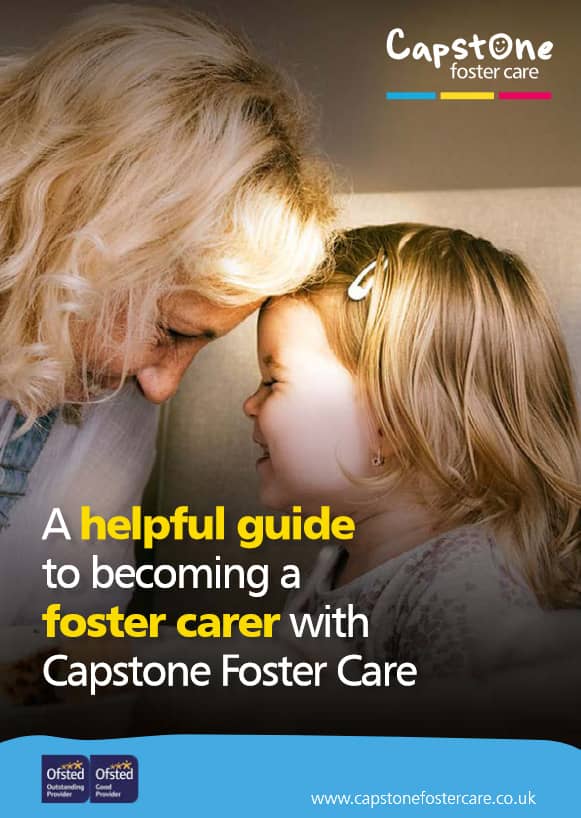


Fostering a disabled child
The role of an independent fostering agency
How to choose a foster care agency
Can I choose who I foster?
What are the benefits of fostering with an independent fostering agency?
What happens when a child is taken into care?
Fostering process: what happens on an initial home visit?
Fostering with local authority vs independent agency
A complete guide to becoming a foster carer
How Are Children in Foster Care Matched with Carers?
Foster Care Budgeting Tips
Becoming A Foster Carer
What is a Care Leaver?
What is a Foster Carer?
Fostering Regulations
How long does it take to become a Foster Carer?
What are the Foster Care requirements?
Changing IFA - Transferring to Capstone
8 reasons why a child may be taken into care
Fostering as a Career
Can you foster if you smoke or vape?
A guide to fostering assessments
LGBTQ+ Fostering
Equality, Inclusion & Anti-discriminatory Practice in Foster Care
What can disqualify you from foster care?
Can you foster if you’re on benefits?
Top transferable job skills to become a foster carer
Fostering as a same sex couple
Fostering while renting
Can you foster if you have mental health issues?
Is there an age limit for fostering in the UK?
Do foster carers get a pension?
How to foster a child: A step by step guide
How do DBS Checks Work?
Can I foster if...?
Mythbusting the top 10 Foster Care Myths
Can I foster if I am disabled?
LGBT Fostering Mythbusting
Can I foster if I have pets?
Can I Foster A Child?
Can I Foster and Work?
Can you Foster with a Criminal Record
Can Single People Foster?
LGBT Family and Foster Care
Fostering across Cultures
Muslim Fostering
Christian Foster Care
Sikh Fostering
Empty Nest Syndrome and Foster Care
Can I Foster?
What is the difference between residential care and foster care?
Fostering Babies and Young Children
What is Kinship Care?
Fostering Babies - Myths
Focusing on Parent & Child Fostering
Fostering Siblings
Fostering Teenagers
Fostering Teenagers - Breaking down the Myths
Fostering Unaccompanied and Asylum Seeking Children
Mother and Baby Foster Placements
Private Fostering
How does therapeutic fostering work?
Young Children Fostering Placements
Difference between short and long-term fostering
Types of self-harm
A Guide to the Foster Care Handbook
Reunification and Birth Parents: A Guide for Foster Carers
What is an EHC Plan? A Guide for Foster Carers
How to prepare a child for becoming a care leaver
Children who foster: impact of fostering on birth children
Fostering LGBTQ+ Youth
How to prepare your home for a foster child
How to help a lonely child: A Guide for Foster Carers
What are the National Minimum Standards for Fostering Services?
10 tips for foster children's education
How to prepare your foster child for secondary school
Tips for coping when foster placements end
Tips for foster parents during Coronavirus
What happens if foster parents get divorced?
5 ways to manage Mother's Day with foster children
Tips for managing foster children's bedtime routines
How to handle foster child bullying
Fostering allowances and the gender pay gap
What discounts can foster carers get?
How to adopt from Foster Care
5 ways to manage Father's Day for children in foster care
8 most common fostering challenges
FosterTalk Membership with Capstone Foster Care
Supporting foster children's contact with birth families
A guide to independent fostering
Keeping Children Safe Online: A Guide For Foster Carers
Movies About Foster Care
Play-based learning strategies for foster carers
A Guide to the Staying Put Program
Why Foster Parent Wellbeing Matters
How to deal with empty nest syndrome
How to recognise signs of depression in foster children
Can you take a foster child on holiday?
Tips and advice on fostering with a disability
10 tips on connecting with your Foster Child
Fostering vs Adoption - What's the difference?
How Fostering can change a future
How to adopt from Foster Care
How to encourage children to read in Foster Care
How to prepare a Foster Child's bedroom
Reading and Storytelling with Babies and Young Children
Supporting Children's Learning
The 20 most recommended books Foster Carers and young people should read
Things you can do when your children leave home
The impact of early childhood traumas on adolescence and adulthood
Anxious Disorders in Foster Children
What is sexual abuse and sexual violence
Foster Child behaviour management strategies
Foster Parent Advice: What to expect in your first year of fostering
Capstone's twelve tips at Christmas
10 celebrities who grew up in Foster Care
Could Millenials be the solution to the Foster Care crisis?
Do you work in Emergency Services?
Form F Assessor and Assessment Training
Foster Care Fortnight
Improving Children's Welfare - Celebrating Universal Children's Day
New Year - New Career - Become a Foster Carer
Young People Charities
Bullying can happen to many children and young people in various circumstances or environments. For example, a child may be bullied in the playground at primary school, during lessons at secondary school, or outside of school in a social environment among peers.
However, when bullying occurs around a foster child, it can be tricky to immediately know the best approach – as the situation must be handled delicately. If you believe your foster child is being bullied or you suspect your foster child may actually be bullying others, our team are on hand to support you 24 hours of the day, 7 days a week – and our informative guidance and advice can help you to manage foster child bullying.
There are many types of bullying that can occur – from racial and cultural bullying, to bullying someone because of their sexual orientation or disability. Sometimes, someone may be bullied simply because they’re different. Bullying can appear in many forms, whether that’s in the playground, in the streets, or even online in the form of cyber bullying. This can include:
Often, it can be difficult to tell if your child is being bullied – especially if they are particularly shy and do not like to open up about their feelings. However, there are some tell-tale signs to watch out for:
Witnessing your foster child being bullied is likely to be upsetting, and you may find it challenging to handle. Our natural reaction is to protect someone we care about – especially if they are younger or more vulnerable – but the correct actions must be taken to ensure the situation is handled carefully, and does not provoke or cause a bigger reaction. If you believe your foster child is being bullied, the first steps you should take are:
Next, it’s beneficial to work together with the child, social workers, teachers and authoritative adults, if applicable, to formulate a plan. This will be tailored to the child’s specific needs – including background history, which is where the social worker will be able to offer insight. Together, you can then identify strategies, such as rehearsing how the child should respond in those situations, or encourage the child to build their confidence and self-esteem in other ways, such as making new friends in other areas.
The most important thing to remember when supporting a child who is being bullied is to show compassion, empathy and patience. It’s likely this experience could be extremely triggering for them, and could bring up some unresolved issues from their childhood, especially if they suffered from abuse or neglect. Working closely with Capstone is integral to ensuring the child feels safe and protected during this time.
As difficult as it is to witness your foster child being bullied, its arguably just as challenging watching your foster child bully others. Foster children may have been exposed to a number of damaging and toxic circumstances during their childhood, so this can become a cause of inflicting the pain on others that they might have felt themselves. Psychologically, this could make them feel more in control of their own lives, and provide a sense of power that they were starved of during abusive or challenging environment in their past.
Although it’s easy to understand why a foster child may feel this way, it’s never condoned – and stopping the bullying should be the number one priority. To prevent bullying from happening in the first place, considerations include:
If you suspect your foster child might be bullying others, you should raise this immediately with:
Your role, collectively, will then be to explain to the foster child why bullying is wrong. This conversation can be challenging – so tips for this include:
If a foster child – or any child – is bullied, this can often lead to long term effects – manifesting in the form of mental health conditions. Without handling a bullying situation quickly and effectively, a number of mental health concerns could arise, such as depression, anxiety, eating disorders, insomnia, attachment disorders and more.
If you believe your foster child is exhibiting any signs or symptoms of a mental health condition, this should be raised with your social worker immediately – and together, you should then seek professional medical help.
For more support and advice around what you should do if your child is being bullied, speak to our supportive staff – here for you any time of day or night.
If you’ve got any questions or would like to find out more about fostering with Capstone, fill out the form below.
An experienced fostering advisor from your local area will then be in touch.

Start the conversation today. Our team of friendly advisors are on hand to answer any foster care questions you may have. We can offer you honest and practical advice that can help you decide if becoming a foster carer is the right path for you.


